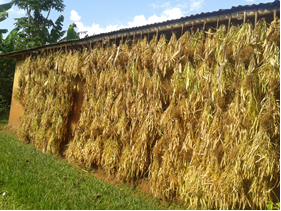
To contend with the compressed cropping season, the Ministry of Agriculture and Animal Resources (MINAGRI) has enacted a set of programmes to reduce post-harvest losses. Among them, the Climate Resilient Post harvest and Agri-business Support Project (PASP) has prioritized connecting business operators with financing institutions and creating awareness on climate risk management.
Source: IFAD social reporting blog
By Viateur Karangwa

Harvest seasons in Rwanda may be followed almost immediately by new planting seasons giving rise to two issues: 1) farmers may have to divide their time between harvesting old crops and preparing for planting new ones, and 2) the weather may be wet at harvest times predisposing harvested crops to moisture related quality deterioration.
PASP has identified training, coaching and close follow up with farmers as an entry point before constructing post-harvest infrastructure. Stakeholders continue to discuss how they can coordinate their efforts to ensure PASP achieves its targets.
Following training sessions held on 24th December 2014, and continued coaching from PASP technical staff and agronomists from sector and district levels, farmers in Murama sector (Ngoma district), pledged to monitor each other to reduce the practice of drying beans on the floor, which exposes the crop to moisture and deterioration.
After the introduction of these disciplinary measures and improved post-harvest practices, members of the KOREMU farmers’ cooperative were able to go from 211 tons to 411 tons of produce sold to national markets.